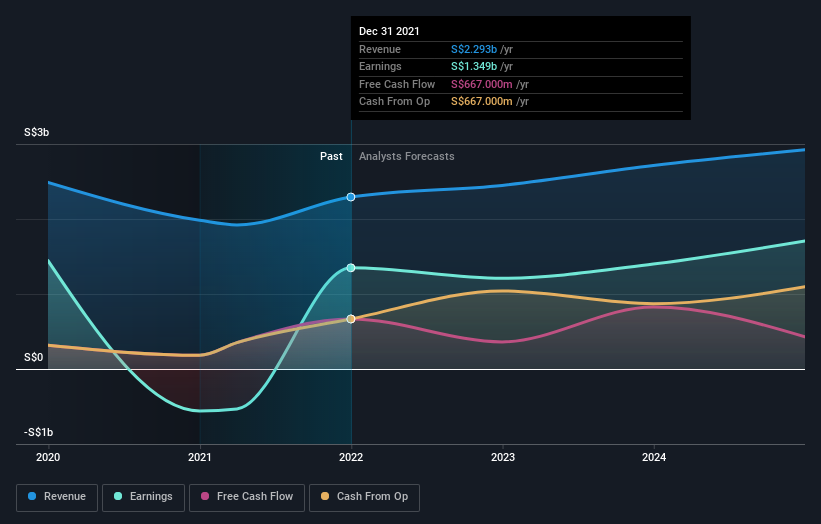- Singapore
- /
- Real Estate
- /
- SGX:9CI
Individual investors own 38% of CapitaLand Investment Limited (SGX:9CI) shares but private companies control 52% of the company

If you want to know who really controls CapitaLand Investment Limited (SGX:9CI), then you'll have to look at the makeup of its share registry. We can see that private companies own the lion's share in the company with 52% ownership. Put another way, the group faces the maximum upside potential (or downside risk).
Meanwhile, individual investors make up 38% of the company’s shareholders.
In the chart below, we zoom in on the different ownership groups of CapitaLand Investment.
Check out our latest analysis for CapitaLand Investment

What Does The Institutional Ownership Tell Us About CapitaLand Investment?
Institutional investors commonly compare their own returns to the returns of a commonly followed index. So they generally do consider buying larger companies that are included in the relevant benchmark index.
We can see that CapitaLand Investment does have institutional investors; and they hold a good portion of the company's stock. This suggests some credibility amongst professional investors. But we can't rely on that fact alone since institutions make bad investments sometimes, just like everyone does. When multiple institutions own a stock, there's always a risk that they are in a 'crowded trade'. When such a trade goes wrong, multiple parties may compete to sell stock fast. This risk is higher in a company without a history of growth. You can see CapitaLand Investment's historic earnings and revenue below, but keep in mind there's always more to the story.

CapitaLand Investment is not owned by hedge funds. Looking at our data, we can see that the largest shareholder is TJ Holdings (III) Pte Ltd. with 52% of shares outstanding. This implies that they have majority interest control of the future of the company. Meanwhile, the second and third largest shareholders, hold 1.9% and 1.9%, of the shares outstanding, respectively.
While studying institutional ownership for a company can add value to your research, it is also a good practice to research analyst recommendations to get a deeper understand of a stock's expected performance. There are a reasonable number of analysts covering the stock, so it might be useful to find out their aggregate view on the future.
Insider Ownership Of CapitaLand Investment
The definition of company insiders can be subjective and does vary between jurisdictions. Our data reflects individual insiders, capturing board members at the very least. The company management answer to the board and the latter should represent the interests of shareholders. Notably, sometimes top-level managers are on the board themselves.
I generally consider insider ownership to be a good thing. However, on some occasions it makes it more difficult for other shareholders to hold the board accountable for decisions.
Our information suggests that CapitaLand Investment Limited insiders own under 1% of the company. We do note, however, it is possible insiders have an indirect interest through a private company or other corporate structure. It is a very large company, so it would be surprising to see insiders own a large proportion of the company. Though their holding amounts to less than 1%, we can see that board members collectively own S$17m worth of shares (at current prices). In this sort of situation, it can be more interesting to see if those insiders have been buying or selling.
General Public Ownership
With a 38% ownership, the general public, mostly comprising of individual investors, have some degree of sway over CapitaLand Investment. While this group can't necessarily call the shots, it can certainly have a real influence on how the company is run.
Private Company Ownership
It seems that Private Companies own 52%, of the CapitaLand Investment stock. It might be worth looking deeper into this. If related parties, such as insiders, have an interest in one of these private companies, that should be disclosed in the annual report. Private companies may also have a strategic interest in the company.
Next Steps:
I find it very interesting to look at who exactly owns a company. But to truly gain insight, we need to consider other information, too. For instance, we've identified 3 warning signs for CapitaLand Investment (1 is concerning) that you should be aware of.
If you are like me, you may want to think about whether this company will grow or shrink. Luckily, you can check this free report showing analyst forecasts for its future.
NB: Figures in this article are calculated using data from the last twelve months, which refer to the 12-month period ending on the last date of the month the financial statement is dated. This may not be consistent with full year annual report figures.
New: AI Stock Screener & Alerts
Our new AI Stock Screener scans the market every day to uncover opportunities.
• Dividend Powerhouses (3%+ Yield)
• Undervalued Small Caps with Insider Buying
• High growth Tech and AI Companies
Or build your own from over 50 metrics.
Have feedback on this article? Concerned about the content? Get in touch with us directly. Alternatively, email editorial-team (at) simplywallst.com.
This article by Simply Wall St is general in nature. We provide commentary based on historical data and analyst forecasts only using an unbiased methodology and our articles are not intended to be financial advice. It does not constitute a recommendation to buy or sell any stock, and does not take account of your objectives, or your financial situation. We aim to bring you long-term focused analysis driven by fundamental data. Note that our analysis may not factor in the latest price-sensitive company announcements or qualitative material. Simply Wall St has no position in any stocks mentioned.
About SGX:9CI
CapitaLand Investment
Headquartered and listed in Singapore, CapitaLand Investment Limited (CLI) is a leading global real asset manager with a strong Asia foothold.
Proven track record with mediocre balance sheet.
Market Insights
Community Narratives



